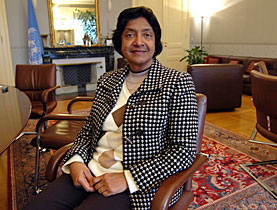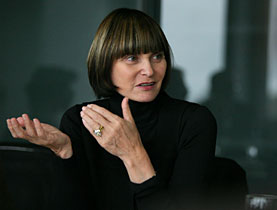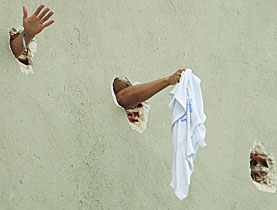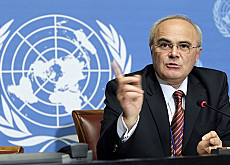Acting for human rights victims around the world

Getting the international community to take human rights seriously is a huge challenge, according to United Nations High Commissioner for Human Rights Navi Pillay.
Pillay talked to swissinfo about her new role and the relevance of the Universal Declaration of Human Rights, the most translated document in the world, which on Wednesday celebrates its 60th birthday.
The daughter of a bus driver, Pillay rose during the apartheid years to become the first non-white South African to start her own law firm and to be appointed as a High Court Judge in South Africa.
Her international career began with her eight-year appointment to the Rwanda tribunal based in Arusha, Tanzania.
She later moved to the International Criminal Court in the Hague and, as in Arusha, was central to the setting of legal precedents for the treatment of genocide suspects, such as jurisprudence on rape as genocide, as well as on issues of freedom of speech and hate propaganda.
swissinfo: How would you explain the job of the High Commissioner for Human Rights to someone who doesn’t know much about the UN system?
Navi Pillay: My job was created by the UN General Assembly. I represent victims all over the world. My work is to make sure that these people’s rights are not violated and that victims are protected. The UN wanted one person to bring their voice to the international forums, to raise it in front of governments. The post was only created in 1993.
swissinfo: What qualities do you need for such a post?
N.P.: You have to be independent and not feel intimidated by the fact that you are confronting those who are violating human rights, mainly states. I can fearlessly point out human rights violations and make recommendations on what should be done. That independence means that I’m only accountable to the General Assembly and to the secretary-general.
swissinfo: What do you hope to achieve?
N.P.: I think that there are many challenges. One is to get the international community to take human rights seriously. I also think there’s a real challenge in helping NGOs and civil society to become strong enough to challenge their governments.
swissinfo: Sometimes people are surprised to see certain countries at the UN Human Rights Council that do not have exemplary human rights records…
N.P.: Let me start by reminding you that December 10 is the 60th Anniversary of the Universal Declaration of Human Rights. This contains “all” the rights – civil, political, economic, social, cultural – that every person is entitled to. Every human being has the right to live in peace, to have human dignity, to have food and water and the proper means to live.
And what’s the main problem we have? Although all states have adopted the rhetoric, they haven’t assumed the duties to make that declaration a reality. So there are gaps in the implementation of the Universal Declaration of Human Rights.
What we have in the Human Rights Council, which as you know is a new body, is that states have agreed to be accountable for their human rights record. So they look at each other’s record, but to make states agree to such a thing you have to make this policy non-judgemental.
swissinfo: Are you talking about the council’s “universal periodic review” (UPR)?
N.P.: Yes. It’s universal, periodic and non-judgemental upon the states. It doesn’t pick on any particular country. It’s more about helping a certain state, providing it with recommendations and pointing out the gaps in their performances.
My office is there to provide cooperation and capacity for the states to help fulfil some of these rights. For example, to develop civil society, to train their police forces, to stop using torture. My office is also there to help NGOs, because in some countries they are very weak. We help them to be aware of their rights and how they can be heard in the Human Rights Council regarding their countries’ performance.
But let me remind you that the Human Rights Council is very new. It’s only two years old, and we have to give this council a chance! It’s a very important concept and a new vision. But there are still many countries out there that don’t want anybody to look at their human rights record and don’t allow their populations or the civil society to criticize them. The UPR has already completed in less than six months the reports on 32 states. And we can’t say that this is nothing. I think it’s a major achievement.
swissinfo: Many analysts think that certain states see the UPR as some sort of western or “imperialist” interference and, therefore, they are not cooperative. How can we ensure progress under such conditions?
N.P.: Yes. That’s a reality. Many states that we are not going to name are very reluctant to have a transparent exposure of their human rights record.
So, what? Do we just sit back and do nothing about it? Or do we support an international forum where everybody, including those reluctant states, will undergo this universal review by their peers? It’s a way of checking upon the record of those states you mentioned.
You have to remember that the Human Rights Council will look at each and every member state. All 192 of them! Before this, we didn’t have any mechanism. We just moaned and complained about states violating Human Rights.
swissinfo-interview: Rodrigo Carrizo Couto
Navi Pillay was born in Durban, South Africa, in 1941 to a modest family of Indian origin. Her local community paid for her to go to university to study law as her family was too poor.
She became the first woman to start a law practice in her home province of Natal in 1967. Over the next few years, she acted as a lawyer for anti-apartheid activists, exposing torture, and helping establish key rights for prisoners on Robben Island, where Nelson Mandela was held.
After taking a doctorate at Harvard University, in 1995, after the end of apartheid, she became the first non-white judge of the South African High Court.
In the same year she was chosen to be a judge on the International Criminal Tribunal for Rwanda (ICTR), where she served a total of eight years, the last four (1999-2003) as president. She played a critical role in the ICTR’s groundbreaking jurisprudence on rape as genocide, as well as on issues of freedom of speech and hate propaganda.
In 2003, she was appointed as a judge on the International Criminal Court in the Hague.
Pillay took over from Louise Arbour as UN High Commissioner for Human Rights on September 1, 2008.

In compliance with the JTI standards
More: SWI swissinfo.ch certified by the Journalism Trust Initiative



You can find an overview of ongoing debates with our journalists here. Please join us!
If you want to start a conversation about a topic raised in this article or want to report factual errors, email us at english@swissinfo.ch.